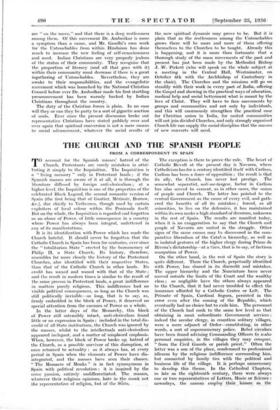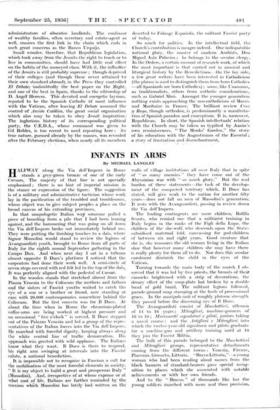THE CHURCH AND THE SPANISH PEOPLE PROM : A CORRESPONDENT IN
SPAIN It is its identification with Power which has made the Church hateful. It should never be forgotten that the Catholic Church in Spain has been for centuries, ever since the " totalitarian State " erected by the bureaucracy of Philip II, a State Church. Its history, therefore, resembles far more closely the history of the Protestant Churches, also identified with their respective States, than that of the Catholic Church in other lands. Its credit has waxed and waned with that of the State ; and the result in modern times is similar to the result of the same process in Protestant lands, a great indifference in matters purely religious. This indifference had no visible political consequences, so long as the Church was still politically invisible—so long, that is to say, as, firmly embedded in the block of Power, it deserved no special attention from the enemies of Power as a whole.
In the latter days of . the Monarchy, this block of Power still ostensibly intact, anti-clericalism found little or no expression in Spain : included in the total dis- credit of all State institutions, the Church was ignored by the masses, whilst to the intellectuals anti-clericalism appeared inelegant, and a matter of misplaced emphasis. When, however, the block of Power broke up. hatred of the Church, as a possible survivor of this disruption, at once returned to actuality : as it always has, at every period in Spain when the elements of Power have dis, integrated, and the masses have . seen their chance. ".The Massacre of Monks " is in fact synonymous in fspain -with political revolution : it is inspired by the same passion, entirely undifferentiated. The masses, whatever their religious opinions, hate in the monk not the:representative of religion, but of the Slate. The exception is there to prove the rule. The heart of CatholiC Revolt at the present day is Navarra,- where Catholicism has fora century identified itself with Carlism. Carlism has been a force of oppositicin ; the result is that its ally, the Church, has never lost prestige. The somewhat separatist, noli-me-langere, factor in Carlism has also served to cement, as in other cases, the union of people and Church. The latter has pointed to the central Government as the cause of every evil, and gath- ered the benefits of all its mistakes ; forced, as all minorities, to live on the defensive, it has maintained within its own ranks a high standard of decorum, unknown in the rest of Spain. The results are manifest today, when it is no exaggeration to say that the Church and people of Navarra are united in the struggle. Other signs of the same causes may be discovered in the com- parative liberalism of the Catalnn hierarchy, as well as in isolated gestures of the higher clergy during Primo de Rivera's dictatorship—at a time, that is to say, of factious usurpation of Power.
On the other hand, in the rest of Spain the story is quite different. There the Church, perpetually identified with Power, has shared in its discredit and mistakes. The upper hierarchy and the Nunciature have never moved outside the limits of the Court and the wealthy class ; so negligible have the others always appeared to the Church, that it had never troubled to effect the insurance afforded by a Catholic Centre or Left. , The Primate of Spain, Cardinal Segura, persisted in this error even after the coming of the Republic, which eventually had no choice but to exile him, The personnel of the Church had sunk to the same low level as that obtaining in most subordinate Government services : indeed the secular clergy, in countless solitary villages, were a mere adjunct of OrderHconstituting, in other words, a sort of supernumerary police. Rebel circulars hive been found advising Commanding Officers to make personal enquiries, in the villages they may conquer, " from the Civil Guards or parish priest." Often the latter was a son of the place, condemned to professional idleness by the religious indifference surrounding him, but connected by family ties with the, political and business life of the village. It .is perhaps unnecessary to develop this theme. In the Cathedral Chapters, so late as the eighteenth century, there were always one or two representatives of Letters, Music or Science : nowadays, the canons employ leiSure as the administrators of absentee landlords. The confessor of wealthy families, often secretary and estate-agent as well, 'ensures the first link in the chain which ends in such great concerns as the - Banco Urquijo.
Small wonder, therefore, that Republican legislation; whieh took away from the Jesuits the right to teach or to live -in communities, should have had little real effect on the habits of the moneyed-class With it, the influence: of the Jesuits -is- still probably supreme ; though deprived of their, colleges (and though • these never attained- itci, their own standard abroad), in the .Press they controlled El .Debate;'-ithildubtedly the • best -paper on the Right, and one of the best in Spain, thanks to the editorship or D. Angel•Herrera. 'This devoted and. energetic layman, reputed to be the''Spsnish-vCatho1ie -tif most influence with the Vatican; after- leaving • El Debate assumed the control-'of Acciolt Catolidt,..the great social organisation which also may be taken to obey Jesuit inspiration., The ingloriona history - of its corresponding political party, the C-.E.D.A., whose 'conimand was given to Gil Robles, is too recent to need repeating here : its true nature, guessed already by the masses, was revealed after the February elections, when nearly all its members deserted to Falange Espaiiola, the militant Fascist party of today. • So much for politics. In the intellectual field, the Church's contribution is meagre indeed. One indisputable national glory, the master of modern Arabists, Don Miguel Asin Palacios ; he belongs to the secular- clergy. In the Orders, a certain amount of research work, of which the most important is that carried out in musical and liturgical history by the-Benedictines, • On the lay- side, a -few great writers -have been interested in Catholicism (the phrase is used to distinguish them from born Catholics —all Spaniards are born Catholics) ; some, like Unamimo as traditionalists, others • from aesthetic considerations, such as Gabriel ,Mir6. Amongst the -younger generation nothing exists approaching -the neo-catholicism of Massis and Maritaine- in France. The -brilliant review .Crux y -Raya, though orthodox, is predominantly -a manifesta- tion of Spanish paradox and conceptism. It is, moreover, Republican:. In short, the-Spanish intellectuals' relation with the Church may be taken as typified: by Azaiia's Own 'reminiscences, " The Monks' Garden," the story of his education with the Augustinians of the Escorial : a story of frustration and disenchantment.



















































 Previous page
Previous page